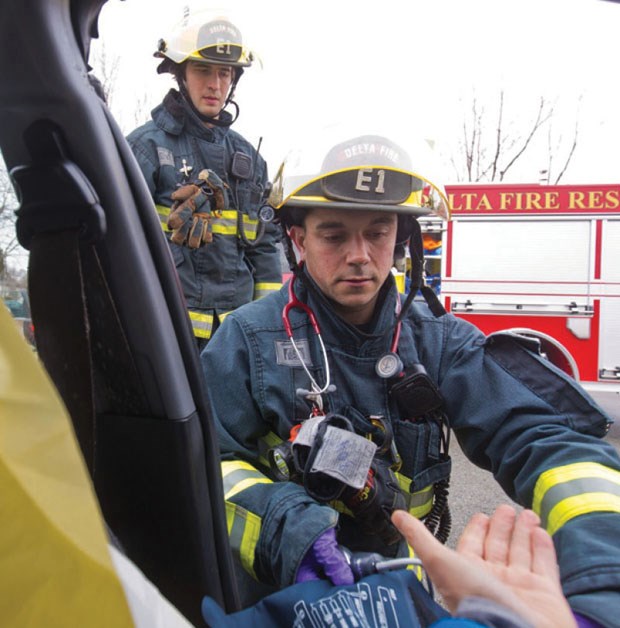Delta’s firefighters’ enhanced medical training hasn’t had a negative impact on patient care or the emergency health system.
That’s according to the city, which says its firefighters are now providing a value added service with a higher level of medical care, working alongside paramedics or before their arrival.
Civic staff were responding to a letter to Delta mayor and council by Cameron Eby, provincial president of the Ambulance Paramedics and Emergency Dispatchers of B.C., CUPE Local 873, whose executive met with Delta officials at last year’s Union of B.C. Municipalities convention. The paramedics union, which also met with provincial officials, is lobbying for improved ambulance and paramedicine services in communities such as Delta.
Calling it dangerous and a potential overload and exhaust of firefighters, paramedics claim, “Given their superior level of training and equipment, B.C. paramedics are the only frontline medical professionals qualified to handle B.C. patients during a medical crisis for early assessment, critical intervention, treatment, monitoring, transport and continuum of care to the emergency department.”
Eby’s letter calls for an investment in more paramedics and raises a concern over the downloading of emergency response to firefighters.
In 2015, Delta Fire and Emergency Services rolled out its program to provide enhanced medical aid, a move not well received by ambulance first responders at the time. Emergency Health Services claimed Delta was acting illegally.
Noting Delta has requested a full-time, 24/7 ambulance station for Tsawwassen since 2005, a civic staff response to Eby’s letter stated there are no indications the medical certification for firefighters has had any deleterious impact. The report also noted a third-party review in December, 2016 found the enhanced skills and knowledge of fire first responders “supports patient care and is a proactive and evidenced-based approach to improving pre-hospital care capabilities.”
In a 2015 letter, Mayor Lois Jackson responded to the concerns, saying Delta had the legal authority to provide ancillary health services and that, with the city’s geography, it makes sense to do so.
“It simply makes sense as the right thing to do to provide this level of service to our residents at municipal cost in the face of increasing challenges for provincially funded ambulance services,” she stated. “I remind you that this is an ancillary service to support and supplement the paramedics, but only until an ambulance arrives, if it arrives at all.”
Jackson stressed that firefighters would not be transporting patients and the city was not trying to provide a competing emergency service.



